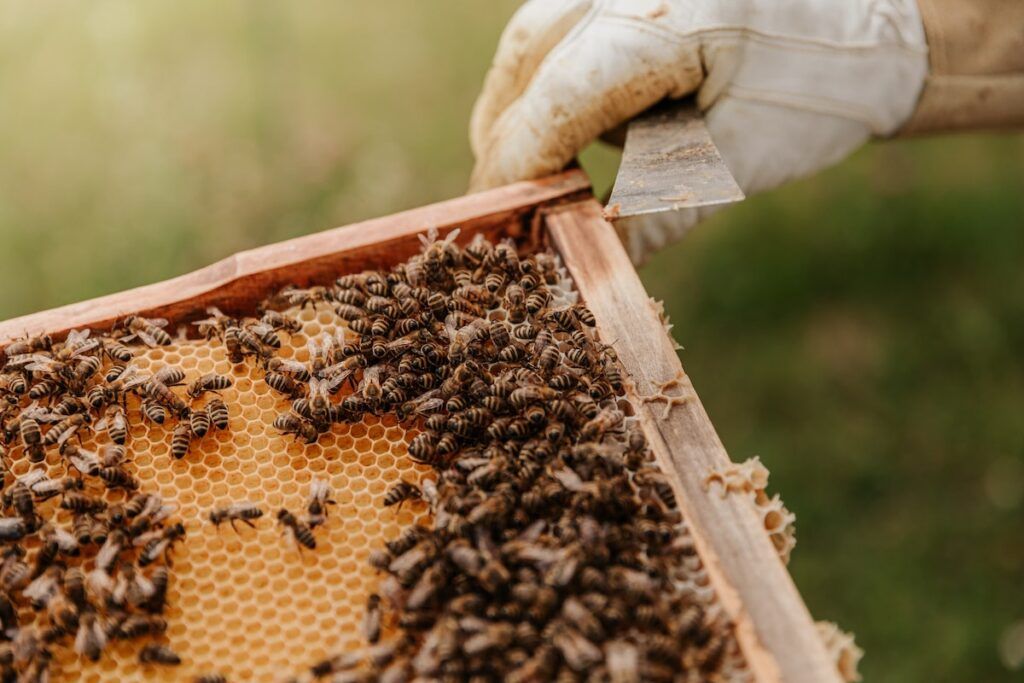On Friday, 20 May, we celebrated World Bee Day, a day that reminds us of the importance of these small animals to our ecosystems and how they serve as great examples of how a successful team works together to achieve a goal.
There are over 20,000 species of bees in the world. A huge number, but just enough to cover the needs of our agri-food system, considering that 75% of leading global crops depend on pollinators such as bees. It goes without saying that without bees (and bee preservation) the natural mechanism that makes our world move would not work the same way it does now. Bees are the engine of the ecosystem and their role in wild plants and crops’ pollination is pivotal for vegetation, animals, and human survival.
In other words, we are all benefitting from bees and their collective efforts. A single colony of bees can pollinate up to 300 million flowers in a day, which makes them one of the most prolific species in the world. This is especially important for those plants which almost completely rely on bees for pollination, like cherries and blueberries, whose pollination process also affects human dietary habits.
How important are bees?
Bees’ impact and importance is not just a matter of pollinating flowers and plants, but also an economic imperative. According to the reports, bees pollinate crops worth a total value of $577 billion annually, a point that makes their preservation an urgent priority for beekeepers, food producers, and policymakers. In fact, with their essential work, bees also contribute to ensuring food security in the world. Because food crops are declining and the global population is growing quickly, bees are the needle of the world’s agri-food sector.
However, even bees are in danger. The loss of their natural habitats, the use of pesticides and chemical products, and climate change are all factors that are currently affecting the animals’ survival, and therefore the entire global ecosystem. It is estimated that between 2006 and 2015, 25% of the global bee population disappeared compared to the population registered before 1990. This means that in the U.S, for example, honey bee populations dropped by 60% between 1945 and 2018, while in Europe 12 species of bees are still currently at risk. Numbers that are highly concerning, considering the importance of bees for the functioning of natural ecosystems, but that force us to reflect on the risks of losing such important animals and on the ways to prevent biodiversity loss.
Cooperation and teamwork: taking bees as role models
Bees are not only a key actor in our ecosystems but they can also teach us a lot about cooperation and other core values. If a joint action is needed to preserve biodiversity and regenerate the environment, having a look at the way hives work can give us interesting inputs. One thing bees do to help one another, for example, is to let the other bees know where the food is. As soon as one bee has found a nectar source, it will go back to the hive to communicate it. Something humans too rarely do as they tend to preserve their food resources, instead of sharing them. The crisis in Ukraine, for example, has shown how much people all over the world are scared of food and energy shortages, but also how hard it is for us to cooperate to build more sustainable and secure systems.
Another interesting fact about bees is that they work together to bridge gaps. Whenever needed, bees join their legs together and festoon to help the others cross the gap. Despite having all different roles, from bee nurses, to food providers, to construction workers, bees know how to work together to help each other succeed as a team, and not as individuals. An ability we have yet to achieve as a global community if we want to effectively contribute to the regeneration of the Earth and the preservation of its natural resources.
Within the Future Food family, we believe that building bridges, sharing information, and working towards common goals are essential to connecting people to ideas. One year has passed since we opened our Paideia Campus in Pollica and Future Food has never stopped believing in the power of food to close cultural, diplomatic, and linguistic gaps. Instead, as a global team that stretches from Italy to the U.S, to Japan and engages with many other countries, we leverage the power of teamwork and cooperation. What we are doing is not just creating an ecosystem but an ecosys-TEAM, where people can join forces, share values and experiences, and strive towards one big goal: Regeneration. As depicted in Future Food’s logo, a hive is what best represents our work: different and unique individuals working together like bees to care one for one another and the Planet.
Behind the Future Food curtain are dozens of diverse, talented, and creative individuals all contributing their unique skills and efforts to helping us achieve our mission of sustainably improving life on Earth.
Please learn more about our amazing team and the work they do on our People page.

